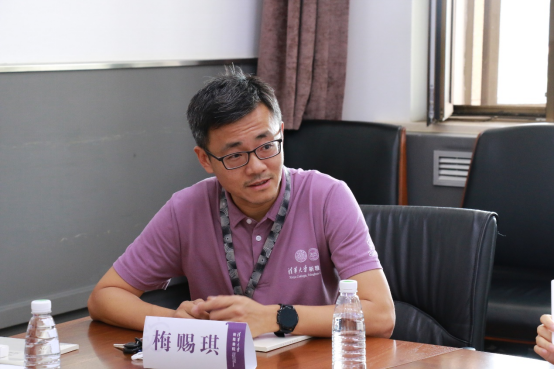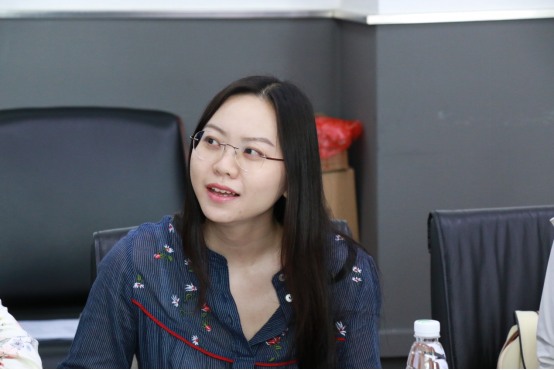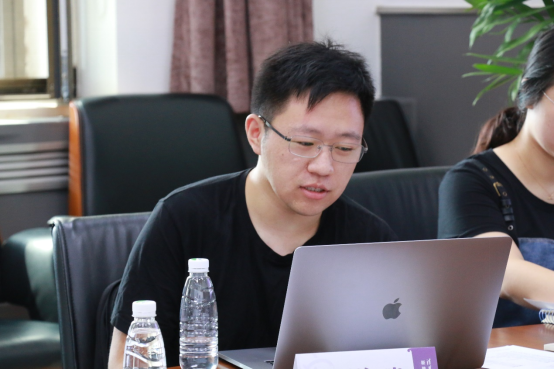Xinya College held the 2022 Fall Semester Teaching Assistant Experience Sharing Meeting in Meeting Room 212 of the Central Main Building on the morning of September 9. Attendees included Mei Ciqi, Dean of Xinya College, Zhang Weite, Deputy Dean of Xinya College, Wang Liping and Zhang Wenjing of College Office, and 15 teaching assistants. The meeting was presided over by Jin Siyu, a major in Philosophy, Politics and Economics (PPE) admitted to the college in 2019.
In his opening speech, Mr. Mei Ciqi shared his experience of serving as a teaching assistant from two aspects. First, teaching assistants must change their attitude. A teaching assistant, who plays an important role in teaching, should actively communicate with teachers to understand their teaching intentions and offer to help students after classes. Second, teaching assistants should endeavor to acquire the ability to impart knowledge through their work. Mr. Mei Ciqi shared his experience as a teaching assistant for the course Mathematical Statistics in the United States. He encouraged the teaching assistants to continuously improve their professional skills and become knowledgeable in their fields.

Later, four teaching assistant representatives shared their experience in small-class discussion, project design, reading & writing, and assignment correction respectively.
Zhang Yunqi introduced the key points of work in all links of the whole process of small-class discussion. Before a class of discussion, a teaching assistant should communicate with a teacher, students and the Group of Teaching Assistants to know such details as the time, venue and grouping, and suggest a rotation system of teaching assistants for the class of discussion. Zhang noted that a class of discussion is not to give answers but to advance discussion at a deeper level. Citing an analogy in The Republic, she thinks that a teaching assistant is expected to master the skills of a farmer, not a horse trainer, and should not constrain students' thoughts but stimulate their potential. After a class of discussion, a teaching assistant should provide immediate feedback to the teacher, collect the minutes of discussion, and give comments and scores to the students.
Wang Hui shared her experience in tutoring the architectural design of students in the course Architecture and Urban Culture. Noticing that most of the students had no basic idea, she tried to help them mobilize their life experience and knowledge. By adopting the classic case study method, Wang helped them gain inspiration for design as soon as possible. She mentioned that when advancing the scheme design, a teaching assistant should make a reasonable timetable, and actively communicate with students to help them realize the transformation from an idea to a scheme. For students who are not familiar with modeling and computer operation, Wang believed that advance intensive training and guidance are necessary. She also advised students not to rely too much on computer-aided design.

Kong Xiangrui shared experience in tutoring freshmen in writing and preventing involution. He thought that special tutoring should be carried out based on the variance in freshmen's abilities to read and write and their reading and writing habits developed in high schools. Tutoring in writing should start after that in reading. A teaching assistant should help students break the habit of reading for impression. Under the teaching assistant's guidance in intensive reading by example, students should be able to understand how the author overcame difficulties and worked hard to create a work, and to imagine the world of thoughts that the author tried to present through those words. Besides, a teaching assistant should encourage students to express themselves in easy-to-understand words instead of jargon. Concepts should serve as tools rather than objects of thinking. A teaching assistant should motivate students when they lack relevant abilities. To prevent involution, Kong suggested that a teaching assistant should not take the length of students' papers and speeches as a scoring criterion. It is necessary to discriminate between sinere writing/speaking and pandering to teachers/teaching assistants. Teaching assistants should ensure that students who concentrate their mind on reading and thinking should get higher scores.

Taking the course Modern Western Philosophy as an example, Pan Yu'ang shared experience in assignment correction and feedback. For assignments with a standardized form, Pan thought that a teaching assistant should finish them by themselves before correcting that of students, so as to better understand why the students get something wrong. During assignment correction, a teaching assistant needs to carefully read students' papers to correct details, and then glance over the papers to grasp the overall structures and examine students' problem awareness. Comments about each paper should be targeted and workable, so that students could correct their own assignment under specific guidance.
In the question-and-answer session, attendees raised questions and exchanged ideas about what had been shared in the meeting. Later, Kong Xinyue said that attention should be paid to standardizing the format of assignments and distinguishing the requirements of different types of writing tasks such as reading reports and theses. Other teaching assistants, including Xie Chang and Wen Jin, had further exchanges on reading and writing tutoring, and communication about course affairs. Xiu Puhua, Sun Hanlin and other teaching assistants discussed teaching design in project grouping and course content presentation. At the meeting, the teaching assistants shared their experience with each other and had adequate communication.
Teaching assistants play an important role in education and teaching, especially under Xinya College's system featuring integration of general and specialized education. Teaching assistants are bridges connecting teachers and students. They not only provide assistance in teaching but also help students solve their problems and clear up their confusion. Teaching assistants are also "boosters" that encourage students make progress from reading to writing and from ideation to creation. More importantly, teaching assistants are companions who grow together with students in teaching. The teaching assistant experience sharing meeting was held to help teaching assistants become clear about their work and responsibilities, promote exchanges and mutual learning among them, and improve the teaching quality at Xinya College together.
